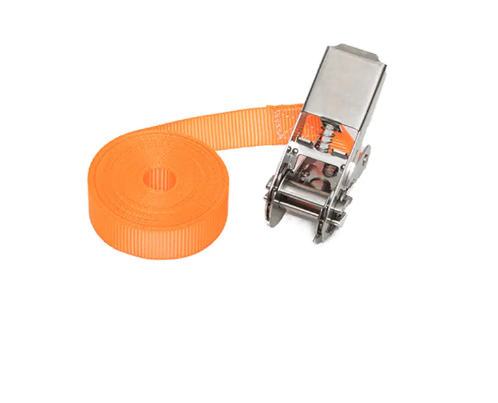No.2 new District Minglun Village,Wuxiang Town,Yinzhou District
-

Tel: +86 18658447778
-

E-mail: [email protected]
-


Content
The maritime transportation environment is high in humidity and salt spray, and ordinary metal parts are prone to corrosion. High-quality loop ratchet straps use high-quality materials and rust-proof metal hooks (such as double J hooks), and their corrosion resistance is verified by salt spray tests, making them suitable for long-term maritime use. For example, some products have passed product certification to ensure stable performance in harsh environments.
Maritime transportation needs to deal with ship shaking and wind and wave impacts, and the load capacity of ratchet straps needs to have a margin. For example, a 5000kg lashing strap is recommended to be operated at 60%-70% of the rated load in actual use to avoid the risk of breakage caused by dynamic force.
Rust-proof maintenance: Regularly check the metal hooks and ratchet mechanisms, and replace or apply anti-rust oil in time if rust is found. Stainless steel or plated parts are more reliable.
UV protection: PE/PP materials are prone to aging when exposed to sunlight for a long time. It is recommended to choose products with anti-UV agents or shorten the replacement cycle.
Operation specification——
Uniform force: Avoid stress concentration caused by local over-tightening of the lashing belt. Cross or ring lashing should be used to disperse the pressure.
Regular inspection: Check the lashing status every 12 hours during navigation, especially after strong winds and waves, and re-tighten.
|
Fastening method |
Applicable scenarios |
Limitations of marine transportation |
|
Ratchet belt |
Heavy cargo container |
Need to use anti-skid pads, metal parts need to be rust-proof |
|
Wire rope/chain |
Overweight cargo |
Easy to corrode, high maintenance cost |
|
Nylon mesh cover |
Prevent bulk cargo from falling |
Cannot resist lateral force when used alone |
Temperature and Humidity: It is recommended to store in an environment with a temperature of 5~35℃ and a relative humidity of 40~75%. High humidity can easily cause metal parts (such as ratchet hooks) to rust, while excessive dryness (humidity below 30%) may accelerate the aging of plastics or webbing.
Avoid direct sunlight or heat sources. Ultraviolet rays will accelerate the aging of polyester/PP webbing; at the same time, a place with less dust and good ventilation should be selected.
Metal Parts Protection: Regularly check whether metal parts such as ratchet hooks are rusted. If necessary, apply anti-rust oil or replace with stainless steel parts.
Cleaning Requirements: After use, remove salt, oil or chemical residues (such as salt spray in the shipping environment) on the surface of the webbing to avoid corrosion of the material. Use neutral detergent for cleaning, and do not use acid and alkali solvents.
Avoid folding or squeezing: It should be stored flat or hung to prevent permanent deformation of the webbing due to long-term folding; the metal ratchet mechanism should avoid compression deformation.
Isolate chemicals: Keep away from corrosive substances such as acid, alkali, organic solvents, and avoid contact with rubber or plastic parts.
Turning and status inspection: When stored for a long time, it is recommended to turn it over once a quarter to check whether the webbing is aging and broken, and whether the metal parts are flexible.
Life management: After frequent use or exposure to harsh environments, it is recommended to replace polyester webbing every 2-3 years; if hardening cracks or strength reduction are found (such as being unable to return to the original state after stretching), it must be stopped immediately.